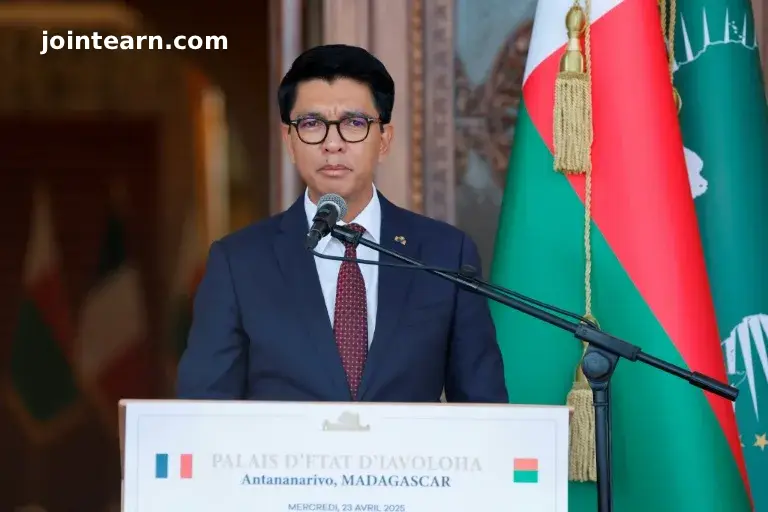
Madagascar’s ousted president, Andry Rajoelina, has officially confirmed that he fled the country last weekend following what he described as “explicit and extremely serious threats” to his life. The revelation comes amid a military-led power grab and a youth-driven protest movement that have plunged the island nation into its worst political crisis in over a decade.
The statement from the Presidency of Madagascar, issued late Wednesday night, said Rajoelina left the country between October 11 and 12. It added that the threats emerged as he was preparing for an official overseas mission.
“Explicit and extremely serious threats were made against the life of the Head of State,” the presidency’s statement said. “These circumstances forced the president to leave the national territory temporarily for his safety.”
While the document did not specify his current location, multiple media reports have indicated that Rajoelina, 51, was evacuated aboard a French military aircraft on Sunday — a claim that has not been officially denied by Paris.
A Dramatic Fall for a Once-Popular Leader
Rajoelina’s confirmation marks the culmination of a remarkable reversal of fortune for a man who once positioned himself as a reformist symbol of Madagascar’s youth.
The former radio DJ and media entrepreneur first seized power in 2009, leading a military-backed coup that ousted then-President Marc Ravalomanana. Sixteen years later, he has been toppled by a similar combination of youth activism and military intervention — the very forces that once elevated him.
The Gen Z protest movement, launched in late September in response to crippling power and water shortages, has since evolved into a broader campaign against corruption, inequality, and nepotism in government.
Military Declares Control, Swears in New Leader
On Tuesday, Colonel Michael Randrianirina, commander of the elite CAPSAT military unit, appeared on national television to announce that the armed forces had taken control of the country.
Randrianirina is expected to be sworn in as interim president on Friday, according to military sources. His faction accused Rajoelina’s administration of “failing the Malagasy people” and claimed that the army’s intervention was necessary to “restore order and national dignity.”
The youth-led protesters quickly welcomed the military’s move.
“The military stood with the people, not the corrupt,” said Fenosoa Razafindrabe, a student leader from Antananarivo. “This is the beginning of a new era for Madagascar.”
International Condemnation of the Coup
The international community has reacted sharply to the developments.
The United Nations denounced the military intervention as an “unconstitutional seizure of power”, calling for an immediate return to civilian rule.
The African Union (AU) followed suit on Wednesday, suspending Madagascar’s membership with immediate effect. AU Commission Chairperson Moussa Faki Mahamat said the organization “firmly condemns any change of government by force” and urged Madagascar’s armed forces to respect the rule of law and democratic order.
France, Madagascar’s former colonial power, has remained cautious but urged for restraint and dialogue. The crisis places Paris in a delicate position, given Rajoelina’s dual French-Malagasy citizenship and allegations of foreign involvement in his evacuation.
Rajoelina Accuses Parliament of Betrayal
From his undisclosed location, Rajoelina has accused members of the National Assembly of colluding with the military to remove him from office.
He insisted that his impeachment proceedings were politically motivated and unconstitutional, claiming that “a small group of ambitious individuals” had “conspired with elements of the army” to stage a coup.
Rajoelina’s political allies, many now in hiding or under arrest, have echoed his accusations. However, the rapid erosion of military and civilian support suggests that his once-formidable power base has largely disintegrated.
Madagascar Joins Growing List of African Nations Under Military Rule
Madagascar is now the sixth African nation since 2020 to experience a military takeover, joining Mali, Burkina Faso, Niger, Gabon, and Guinea — all former French colonies that have faced similar instability.
Analysts say these coups are part of a broader generational and geopolitical shift on the continent, where younger populations are demanding accountability and rejecting perceived Western influence.
“The parallels are striking,” said Dr. Aminata Diop, a political analyst with the African Governance Institute. “From the Sahel to the Indian Ocean, military interventions are increasingly justified as ‘responses to corruption,’ but they often reflect deeper failures of governance and economic inequality.”
Economic Struggles and Youth Discontent at the Core
The crisis underscores Madagascar’s chronic socioeconomic challenges. The country of 30 million people remains one of the poorest in the world, with three-quarters of the population living below the poverty line, according to the World Bank.
Frequent power outages, rising living costs, and allegations of nepotism have fueled the anger of a young, digitally connected population that has little faith in traditional political institutions.
Rajoelina’s fall from power represents more than just a political upheaval — it is a reflection of youth frustration and systemic inequality that have defined Madagascar’s post-independence history.
Uncertain Future Ahead
As of Thursday morning, the location of former President Rajoelina remains unknown, and the nation’s future appears uncertain. The streets of Antananarivo remain filled with protesters celebrating what they call a “people’s victory,” while political analysts warn that the situation could quickly deteriorate into further instability if the military consolidates control without a clear roadmap to elections.
For now, Madagascar stands at a crossroads — torn between the promise of renewal and the peril of another cycle of coups and broken democracy.


Leave a Reply